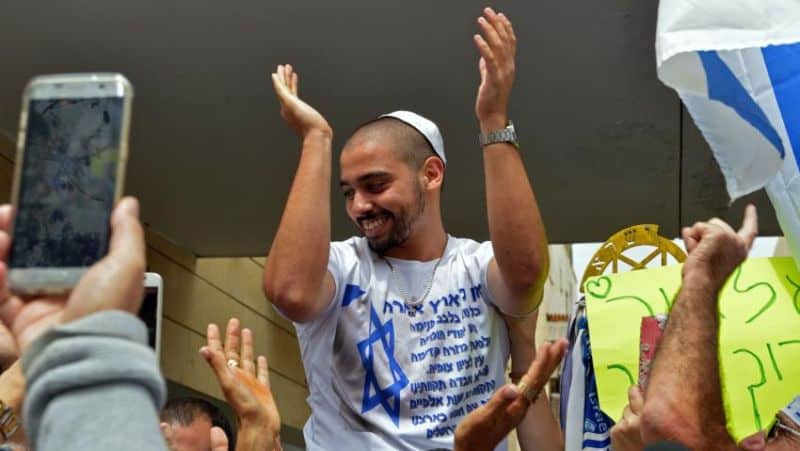Ramla: An Israeli soldier convicted of manslaughter for shooting dead a prone Palestinian assailant was freed from prison on Tuesday and greeted by supporters as a hero after serving nine months behind bars, half his original sentence. Elor Azaria was lifted onto the shoulders of a man who was part of a small group of supporters outside his home following his release and he later paraded the streets in celebration in a small convoy of cars and motorcycles. “We’ve been through a very difficult period, very difficult,” Azaria’s father Charlie told supporters.
“Today we’re celebrating. We’ll continue to rejoice. There will be a time and place to say what we have to say.” Azaria did not speak to supporters but smiled broadly as he was lifted in celebration. Some family members wore T-shirts with Azaria’s photo on it. The former soldier was initially condemned to 18 months in prison for the 2016 killing of Abdul Fatah al-Sharif in the occupied West Bank city of Hebron. Armed forces chief of staff Gadi Eisenkot later reduced the term by four months and in March a parole board ordered a further cut, to a total of nine months.
Azaria was released two days ahead of schedule, and as word of it spread supporters began to visit his home in Ramla near Tel Aviv, including the city’s mayor. Israeli media said he was freed early from Tzrifim military prison to allow him to attend his brother’s wedding. The military confirmed his release but provided no further details. A sign outside Azaria’s home said “welcome back Elor the hero”. Education Minister Naftali Bennett, head of the far-right Jewish Home party, tweeted his congratulations to Azaria along with a picture of the family, saying “it’s good to have you home”. Prime Minister Benjamin Netanyahu, who had called for the former soldier to receive a presidential pardon, told reporters he was “happy that the affair is over”.
– ‘Nothing we can do’ –
The release however drew further anger from Palestinians, who have called his sentence outrageously short.
The mother of the Palestinian killed by Azaria spoke of her resignation.
“There is nothing we can do,” Rajaa al-Sharif told AFP at her home in Hebron. “This is something natural for them.”
The Palestinian foreign ministry called the sentence “racist”.
It accused Israel of “encouraging the occupation soldiers to continue field executions of unarmed Palestinian citizens with full cover and protection from occupation authorities”.
Azaria, who was 19 at the time of the 2016 shooting, began serving his sentence on August 9. Prisoners in Israel often have their sentences cut by a third for good behaviour.
The shooting incident was caught on video by a human rights group and spread widely online.
It showed Sharif, 21, lying wounded on the ground, shot along with another Palestinian after stabbing and wounding a soldier, according to the army.
Some 11 minutes after the initial shooting, Azaria, a sergeant and military medic at the time of the incident, shot him in the head without any apparent provocation.
He said he feared Sharif was wearing an explosive belt and could blow himself up, a claim judges rejected.
The trial captivated Israel and highlighted deep divisions in public opinion between those who denounced the shooting and others who said it was justified.
Senior army officers strongly denounced Azaria’s actions, but right-wing politicians, including Netanyahu, called for him to be pardoned.
Comparisons have been drawn to sentences handed out to Palestinians for lesser crimes.
Those critical of Azaria’s sentence have in particular pointed to the jail term of Palestinian teenager Ahed Tamimi.
She was sentenced to eight months in prison in a plea deal after a video that went viral showed Tamimi, 16 at the time, slapping two Israeli soldiers in the West Bank in December.
AFP

